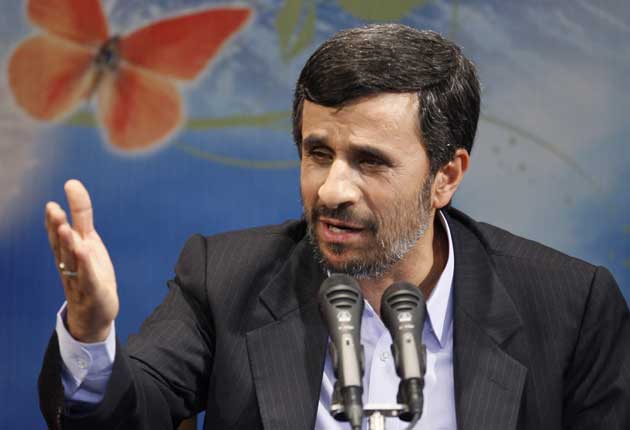Iran may be closer than we think to having nuclear missiles, says UN
Report likely to strengthen resolve of West to tackle Tehran's intransigence

Your support helps us to tell the story
From reproductive rights to climate change to Big Tech, The Independent is on the ground when the story is developing. Whether it's investigating the financials of Elon Musk's pro-Trump PAC or producing our latest documentary, 'The A Word', which shines a light on the American women fighting for reproductive rights, we know how important it is to parse out the facts from the messaging.
At such a critical moment in US history, we need reporters on the ground. Your donation allows us to keep sending journalists to speak to both sides of the story.
The Independent is trusted by Americans across the entire political spectrum. And unlike many other quality news outlets, we choose not to lock Americans out of our reporting and analysis with paywalls. We believe quality journalism should be available to everyone, paid for by those who can afford it.
Your support makes all the difference.In a sharp and potentially ominous new warning, the UN's nuclear watchdog in Vienna is set to say for the first time there are reasons to fear that Iran may be on its way to attaching nuclear payloads to its stock of ballistic missiles.
The finding, leaked from a report to be released next month, is certain to stoke concerns that time is running out to take firmer action against Tehran, which has played a game of cat-and-mouse with the West for years, claiming its nuclear activities are civilian in nature while ignoring UN resolutions demanding that it cease its uranium enrichment activities.
Israel has openly warned that it cannot close the door on a possible military strike against Iran. It is well within range of some Iranian missiles and Iran's president, Mahmoud Ahmadinejad, has spoken more than once about the need to "wipe Israel off the map".
The new report by the International Atomic Energy Agency in Vienna is written by new director, Yukiya Amano, and is to be presented at a meeting next month. Its content was seen yesterday by reporters from both the Associated Press and Reuters. A US state department spokesman said the report played in to Washington's "ongoing concerns" about Iran's behaviour. P J Crowley also said the US did not understand why Iran refused to "come to the table and engage constructively" over its programme. "You have to draw some conclusions from that," he added.
The report's pages also contain confirmation that Iran was able successfully to enrich a very small amount of its uranium stockpile to a level of 20 per cent almost immediately upon announcing that it intended to so earlier this month. While that is still not nearly far enough to produce material for a bomb, the amount of additional enriching necessary to reach that point is relatively small, experts say.
Under Mr Amano's predecessor at the IAEA, Mohamed ElBaradei, the agency was seen as downplaying worries that Iran was using the cover of civilian nuclear development to conceal much more dangerous goals. Mr ElBaradei, for a long time regarded with some suspicion by Washington and other western capitals, has since expressed an interest in running to be the President of Egypt.
The new IAEA language meanwhile contradicts the most recent intelligence assessment of the United States that while Iran was indeed pursuing a nuclear bomb before it suspended all such activity in 2003. However, a new US assessment is expected shortly and is likely to paint a much darker picture of Iran's true intentions.
In his report Mr Amano complains of Iran's continuing resistance to efforts by his agency to look for signs of a cover-up and said that this does "give rise to concerns about possible military dimensions to Iran's nuclear program".
While the new IAEA findings will doubtless alarm Washington as well as London and other European capitals, it may help to strengthen the resolve of countries as they prepare to debate a fourth round of sanctions against Iran at the UN in New York.
A harsh report from the IAEA may also make it harder for China, which has long resisted stronger measures, to resist calls for new sanctions. Iran responded to the news reports with a statement from its envoy to the IAEA suggesting the report merelty proved the country's peaceful intent. "The IAEA's new report confirmed Iran's peaceful nuclear activities and the country's non-deviation towards military purposes," Ali Asghar Soltanieh told IRNA, an Iranian news agency.
Join our commenting forum
Join thought-provoking conversations, follow other Independent readers and see their replies
Comments